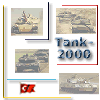|
|
The questions have come at a time when Turkey's plan to co-produce 1,000 new-generation MBTs, in a project in which a German firm and three other foreign companies are competing, has once more caused discontent between Ankara and Berlin. The recent row within Germany's coalition government over Turkey's tank project erupted further this past week when Krauss-Maffei Wegmann formally applied on March 14 to the German Foreign Ministry for an export license for its tanks. Turkey's MBT project was once more placed on the agenda during a conference last week by Germany's coalition Green Party. But a government spokesman, while confirming that the German manufacturer of Leopard 2 tanks applied to the Foreign Ministry on March 14, said that there is no chance of such a shipment being approved at present, citing concerns over human rights in Turkey. Until yesterday the only official reaction to German concerns over Turkey's tank tender came from Turkish Prime Minister Bulent Ecevit who said that nothing was yet official in the tank tender. However, the general silence in Ankara is being interpreted as an attempt by Turkey to see the German reaction to the export license application by Krauss-Maffei Wegmann. The tank issue has highlighted a dilemma on the part of both Turkey and Germany. Despite opening a tender for the co-production of MBTs, Turkey has always given the impression that the Turkish military favor Krauss-Maffei Wegmann even though three other foreign companies are competing for the project. Demonstration tanks of the four companies are currently undergoing test trials in Kayseri. The impression that the Turkish military favors Leopard 2 tanks may create concern not only among other competing companies, which have invested heavily in the hope of winning the tender, but will also raise questions over the rationale of opening a bid while indicating that Ankara only wants German tanks. This policy will not only endanger fair competition among the companies but will also prevent Ankara from obtaining the best technology for the establishment of its tank infrastructure. Germany, on its part, is caught between concerns over Turkey's human rights record and concerns over the risk of losing such a major project -- valued at $7 billion for all 1,000 tanks -- for its arms industry. It is estimated that Germany will earn DM 10 billion and Krauss-Maffei Wegmann will be able ensure employment of its 6,000-strong workforce for 10 years if it wins the tank tender. Turkey, as in the case of its attack helicopter project, has requested that companies provide export license guarantees for their models competing in the tender. Turkey's principal aim in seeking such guarantees is to avoid future interruptions in its major arms projects due to political fluctuations. Under the normal procedure once a company is selected as a winner in the tender the country opening the bid should formally apply to the country whose company has been selected. The two U.S. companies, one of which was eliminated together with a German-French consortium, in the attack helicopter project were unable to make any commitments to Turkey on export guarantees. Similarly Turkey has asked the companies competing in the MBT project to supply Ankara with export license guarantees. Turkey's deadline for export license clearance in the tank tender expired on Feb. 29 with only the Ukraine offering guarantees, France, the United States and Germany did not respond. Turkish contractors are cooperating with foreign companies offering MBT designs. U.S.-based General Dynamics Land Systems, which offers the M1A2 fitted with a diesel engine, has teamed with BMC. Germany's Krauss-Maffei Wegmann, bidding the Leopard 2A6, has established a consortium with Otokar. Offering the Leclerc, France's Giat Industries has teamed with Roketsan and Ukraine's Ukrspetsexport has teamed with Asmas to offer the T-84. In both the attack helicopter and tank projects it has always been U.S. and German companies which have been highlighted in the press as respective favorites to win the tenders, leading to speculation that Turkey is pro-U.S. in the attack helicopter project and Germany in tank project. This policy has also been perceived as an attempt by Ankara to create a political balance between Europe and the U.S. in its two main defense projects. The request for proposals issued by the Undersecretariat for the Defense Industry (SSM) call for bids is for four prototype MBTs and an initial production batch of 250 vehicles. Turkey said it will make its final choice on the tender in mid-July this year. (Turkish Daily News, Lale Sariibrahimoglu)
|

 Questions
have started to be raised in Ankara over whether a secret deal has taken
place between Turkey and Germany in contracting the multi-billion-dollar
third generation main battle tank (MBT) project to Berlin. These
questions were sparked by various rumors, including speculation that
German Defense Minister Rudolf Scharping received a positive response to
his request for Krauss-Maffei Wegmann, the German manufacturer of
Leopard 2 tanks, to be awarded the tender by the Turkish military.
Scharping reportedly made this request during a visit to Ankara at the
end of December last year.
Questions
have started to be raised in Ankara over whether a secret deal has taken
place between Turkey and Germany in contracting the multi-billion-dollar
third generation main battle tank (MBT) project to Berlin. These
questions were sparked by various rumors, including speculation that
German Defense Minister Rudolf Scharping received a positive response to
his request for Krauss-Maffei Wegmann, the German manufacturer of
Leopard 2 tanks, to be awarded the tender by the Turkish military.
Scharping reportedly made this request during a visit to Ankara at the
end of December last year.